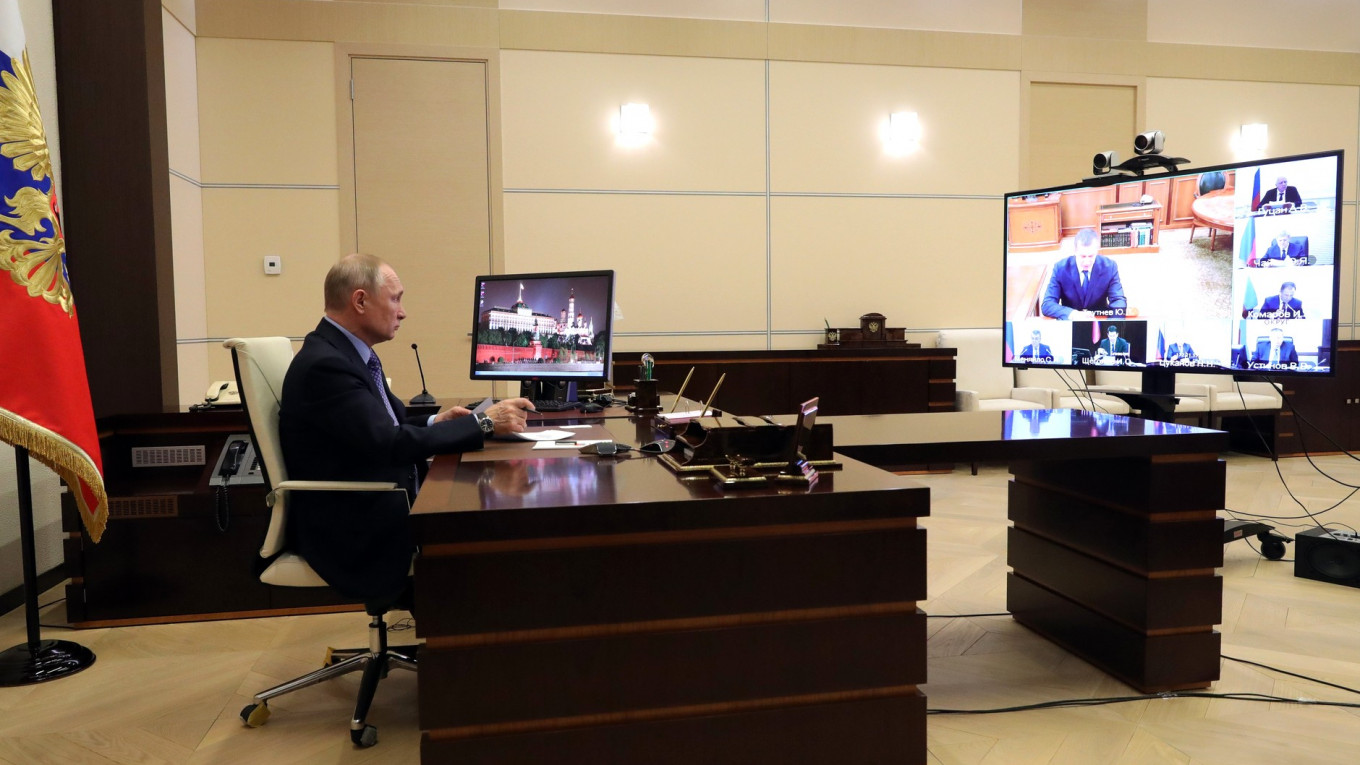On Monday evening, state-controlled television showed President Vladimir Putin holding a video conference with his envoys in the federal districts. Despite the fact that Putin looked a bit less energetic than in the past, it was critically important that the Russian people see him. He had been conspicuously absent for several days prior, even as other politicians had become more active than ever. But was it too late?
Only a half-day earlier, Russia had finished sealing off all its borders for the first time in post-Soviet history and Muscovites had been plunged into a legally dubious quasi-curfew forbidding anyone to leave home without a special pass.
Of all the freedoms the Russian people have achieved over the past 30 years, it seems that only the freedom of speech on the internet remains. All of the major social networks continue working and throughout the first night of total lockdown in Moscow, people spun one online conspiracy theory after another, each one worse than last. And all of them stemmed from one simple question: Where is Putin?
The Russian president — who, until only recently, had so deftly guided world events to his liking and was poised to bend the Constitution to his will — has now just up and disappeared.
Putin addressed the nation only once during the pandemic — in an odd speech last week. It was unusual, first because he appeared two hours later than the time originally announced. Second, he sat in a strange and awkward pose. Was he trying to exude confidence or deal with a pinched nerve in his back?
Third, and most importantly, though, Putin called for a weeklong holiday rather than a period of quarantine, and wound up talking about a new tax for everyone with more than a million rubles ($12,500) on their bank account.
Putin apparently wanted to avoid inciting fear or panic, but viewers took his talk of a holiday literally and headed off for the nearest parks to have picnics. Now, state TV is trying to stigmatize them for behavior that, given what Putin told them, seems entirely understandable.
Then, after his muddled televised address, Putin vanished. Is he holed up somewhere in the mountains near the Black Sea or ensconced at his residence on the Volga? Who knows? It isn’t just that Putin has taken a less active role in managing the crisis — he has disappeared altogether.
As a result, very strange things began to occur on Sunday evening that added fuel to the conspiracy theory fire.
First, Moscow Mayor Sergei Sobyanin and the region’s governor imposed measures amounting to a state of emergency, then, an ominous video began circulating online of police cars driving through cities near Moscow, announcing a curfew by loudspeaker. After that, Russia Today Editor-in-Chief Margarita Simonyan reappeared on Twitter after a five-day absence to deny that a curfew had been imposed.
Next, state news agency RIA Novosti reported that the police officers shown in the curfew video were under investigation for abuse of authority. Meanwhile, the same people who had only a short time earlier tried to rewrite the Constitution beyond all recognition to help Putin remain in office indefinitely now accused the Moscow mayor of exceeding his constitutional limits.
And that’s not all. When asked late one evening over the weekend whether the Moscow authorities were acting within their legal authority, Putin’s press secretary offered only a laconic “Da.”
The cherry on this kooky cake came closer to midnight, with the broadcast of a video message by Dmitry Medvedev, the former prime minister who was all but forgotten after his dismissal in January. Unlike Putin in his address last week, Medvedev emphasized the human rather than the economic aspect of the current crisis.
The picture all this created was of panic, chaos and confusion — a display unusual among Russia’s ruling elites. That is why everyone, supporters and critics alike, began asking ever more insistently: where is Putin?
In fact, this might all be part of Putin’s plan. Maybe he wanted to provoke a small internecine crisis among the elites, see how they reacted, then step in as chief arbiter.
In addition, Putin has a reputation for not liking to associate himself directly with measures that citizens find harsh or unpleasant, so he probably delegated the task to Sobyanin and essentially gave the mayor carte blanche — knowing that he could always correct whatever missteps Sobyanin might make.
But only those who have long studied the Byzantine intricacies of Kremlin politics can understand such logic. The average person sees something else entirely.
Aside from the brief Russian-Georgian War in 2008, this is the first time in 20 years that Putin has not personally managed a major national crisis. Not only that, but he has deliberately distanced himself from it and stepped “into the wings.” Now, everyone’s attention is focused on Sobyanin — who also happens to head the government’s fight against the pandemic — and on the new prime minister.
Rumors that the two men have seized power are obviously just hysterical speculation circulating on social networks, but the very fact that people allow themselves such thoughts is very telling. Putin has always been the leader of the pack, but this is the first time he has let anyone else assume that role.
Or has he? Maybe he is only pretending to let Sobyanin lead, knowing that the mayor will eventually become a scapegoat. That would certainly be an interesting scheme.
A Message from The Moscow Times:
Dear readers,
We are facing unprecedented challenges. Russia's Prosecutor General's Office has designated The Moscow Times as an "undesirable" organization, criminalizing our work and putting our staff at risk of prosecution. This follows our earlier unjust labeling as a "foreign agent."
These actions are direct attempts to silence independent journalism in Russia. The authorities claim our work "discredits the decisions of the Russian leadership." We see things differently: we strive to provide accurate, unbiased reporting on Russia.
We, the journalists of The Moscow Times, refuse to be silenced. But to continue our work, we need your help.
Your support, no matter how small, makes a world of difference. If you can, please support us monthly starting from just $2. It's quick to set up, and every contribution makes a significant impact.
By supporting The Moscow Times, you're defending open, independent journalism in the face of repression. Thank you for standing with us.
Remind me later.








